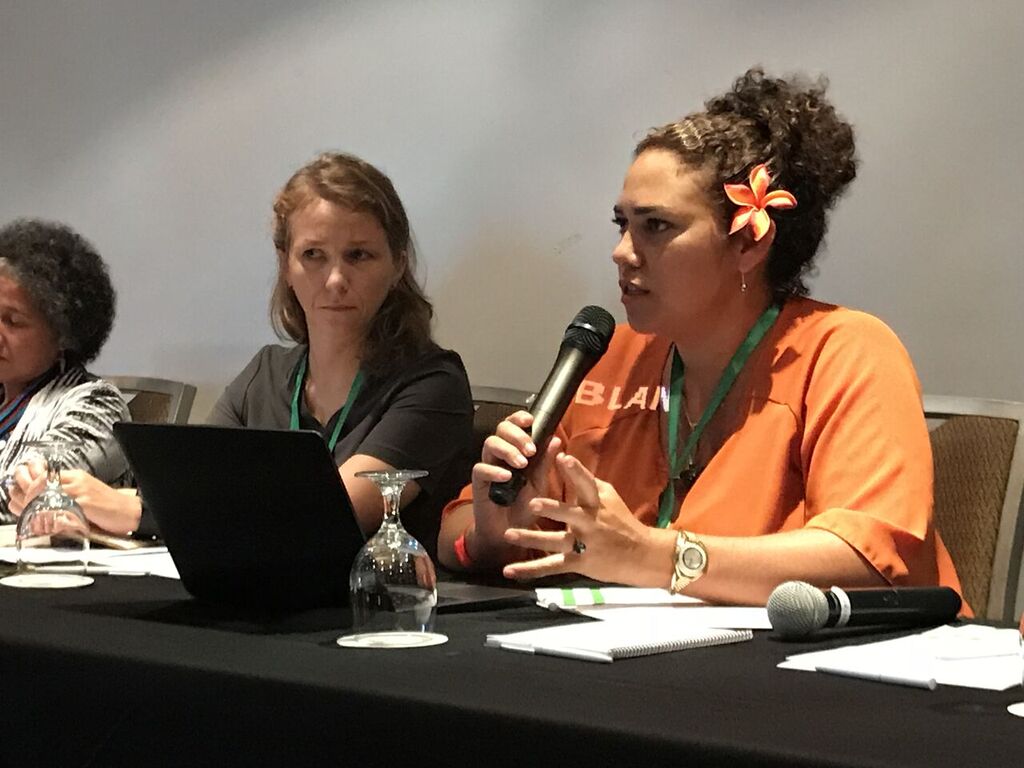Pacific Island Countries’ Leadership on NDC Implementation

Ms. Cora Pasisi from GCF speaks during a panel discussion on Financing NDC Implementation.
The Pacific is home to small island countries that are already experiencing the devastating effects of climate change, including rising sea levels and an increase in natural disasters. While the region has made significant development progress, economic growth is hampered in many of these countries by their isolation from major markets and their tiny size (Niue, for example, is a country of approximately 100 square miles and 1,700 residents). This is exacerbated by the high costs of fossil fuel imports, transportation, and shipping in the region. Despite these and other development obstacles, Pacific countries are taking a leadership role on climate change by encouraging ambitious global action, reducing their own already-miniscule greenhouse gas emissions, and improving resilience to the impacts of climate change – a priority for the region.
This leadership was evident at the Pacific Regional Dialogue on Nationally Determined Contributions (NDCs), which was recently hosted by the Government of Fiji in the context of the Paris Agreement. The dialogue convened all 14 Pacific island countries to exchange national experiences on NDC implementation planning, including linkages to the Sustainable Development Goals (SDGs), and opportunities to engage the private sector, advance gender equality, and link with energy sector planning. The countries also discussed how they would carry their work forward through the recently established Regional Pacific NDC Hub, an arm of the NDC Partnership.

The Pacific’s leadership on climate change stood out in the following four ways:
- Fiji’s presidency of the COP. Fiji, the host of the dialogue, is the current COP president and presided over last year’s climate summit as the first small island developing state (SIDS) to do so. This has allowed Fiji to draw attention to the unique challenges that SIDS face in terms of climate change impacts and resilience-building, and to increase the visibility of the Pacific’s commitment to do its part in mitigating climate change. This leadership in the global climate change process is helping to drive momentum globally and pave the way for more ambitious climate action around the world.
- Significant progress toward NDC targets. During the course of the dialogue, it became clear that several countries in the region are already approaching the NDC targets they put forward for 2025. Placing a high priority on energy access and energy independence, most Pacific countries’ NDCs strive for a substantial increase in renewable energy – in some cases aiming to derive 100 percent of electricity from renewable sources. It was impressive to hear in Fiji that some Pacific countries are already close to achieving these renewable energy targets for 2025, moving them closer to the global SDGs as well.
- Preparations for more ambitious future NDCs. As part of the Paris Agreement, countries are to put forward increasingly ambitious NDCs every five years. Some countries expressed during the dialogue that, because of progress made to date, they might be able to increase their renewable energy targets in future NDCs. Some countries with energy-only NDCs also expressed the possibility of adding additional sectors, as well as strengthening adaptation components. This means that the Pacific may be well positioned to ratchet up ambition in the next round of NDCs submitted in 2020.
- Innovative, development-centered approach. Pacific countries are making progress in developing NDC implementation plans (in many cases building on energy plans or strategies), setting up institutional frameworks, and establishing “green” funds. Rapid progress has been made in many countries because it makes sense in terms of advancing long-standing national development priorities, such as growing their economies or improving energy access and security. Given the size of Pacific countries and their NDCs’ emphasis on the energy sector, countries in the region are also discussing innovative opportunities for regional collaboration on NDC implementation like bundling renewable energy projects across countries to attract private investment.
Through their impressive efforts on climate change, Pacific island countries have led by example and raised the profile of the region on the global stage. It is clear from their progress on NDC implementation that these countries have significant experiences to share with the world. One forum through which countries from the Pacific and elsewhere can do so is the 2018 Talanoa Facilitative Dialogue. A key achievement of COP-23, it will allow countries to showcase their progress on NDC implementation and identify opportunities to raise the ambition of future NDCs in the spirit of “talanoa” – a traditional Fijian word that represents an inclusive, participatory process to share experiences and build trust and empathy.
The Fiji dialogue – the third in the region – was organized by the UN Development Programme (UNDP) and the UNFCCC Secretariat as part of a global series of NDC Regional Dialogues. Originally launched in 2014 in support of the Paris Agreement, this initiative has been convening representatives from countries, the private sector, and other institutions to further an exchange of experiences on NDC design and implementation. The Fiji dialogue was co-organized with the German Agency for International Cooperation, the NDC Partnership, the Secretariat of the Pacific Regional Environment Programme, the Secretariat of the Pacific Community, and the Global Green Growth Institute, which are leading the design of the Regional Pacific NDC Hub.
Michael Comstock is a Climate Technical Specialist at UNDP.
UNDP and the UNFCCC Secretariat are grateful for the European Union and the Governments of Germany, Japan, and Norway for their support of the NDC Regional Dialogue initiative.
